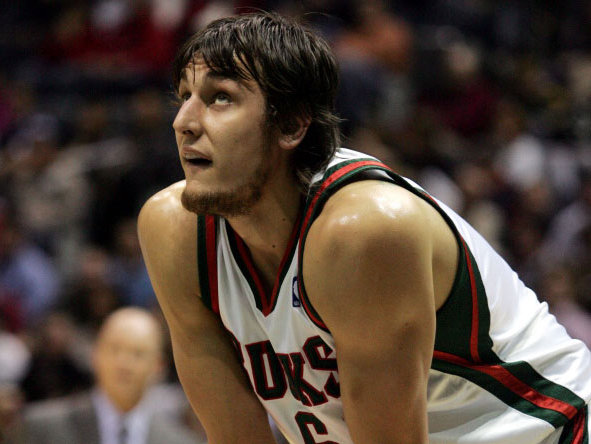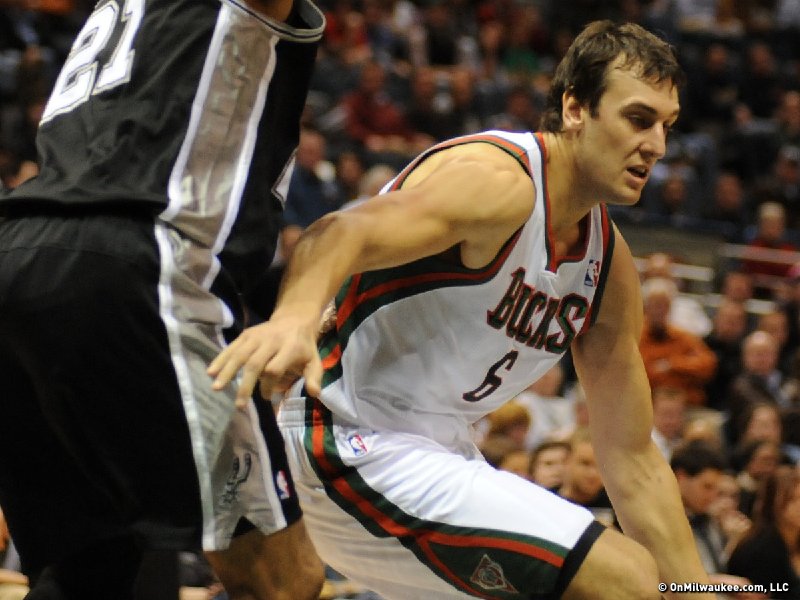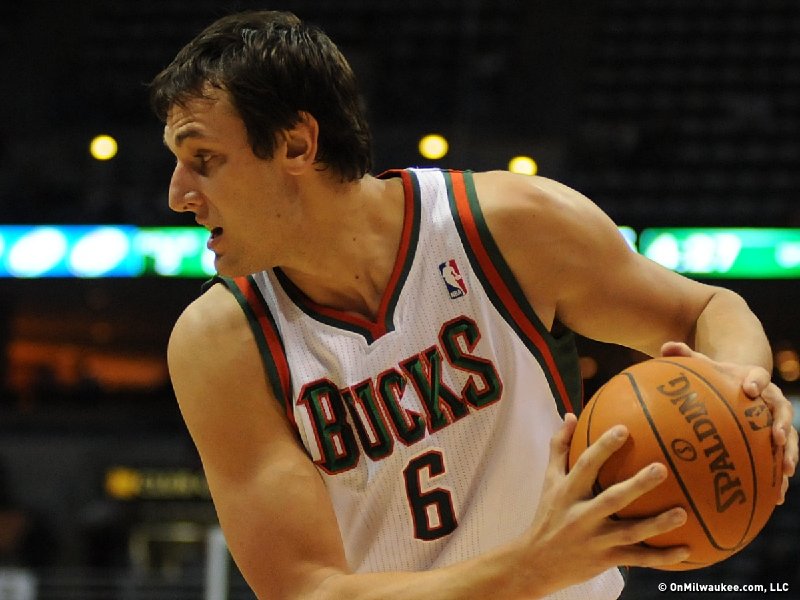Bucks' center Andrew Bogut's business is basketball. While the rigorous 82-game National Basketball Association season does not leave a lot of time for hobbies, it helps that one of Bogut's off-court interests is the business of basketball.
That was especially evident earlier this month.
Bogut, a former No. 1 pick who is one quarter of the way through his fourth season in Milwaukee, made headlines "back home" when he made a sizable donation to the Sydney Spirit, a professional team in Australia's National Basketball League.
The Spirit, formerly known as the West Sydney Razorbacks, were on the brink of folding when the league stepped forward with a financial rescue package that ensured the club would finish the season.
Bogut's donation, which was unsolicited and more of a personal gesture than an investment, helped ease some of the burden while drawing attention to the team's plight and sparking renewed interest in sponsorships for the club.
After the Bucks' home victory over Charlotte Friday night at the Bradley Center, OnMilwaukee.com chatted with Bogut about the business of basketball -- both both in the U.S. and Australia -- and his interest in getting involved in a management / ownership role when his playing days are over.
OnMilwaukee.com: You haven't had very good luck with injuries this year (left knee bone bruise, right ankle sprain, migraine headache). How are you feeling now?
Andrew Bogut: It's been frustrating but it happens to everyone. It's part of the game.
I got rid of the flu, the migraines; I'm over that. The only thing now is I've got a couple niggling injuries I'm trying to battle through. But, other than that, I'm feeling great.
The next three or four days I can't wait to get some sun (in Phoenix and L.A.) and it might solve all my worries.
OMC: Whether I'm attending a game at the Bradley Center or watching games on TV, I can't help noticing that there are a lot of empty seats. Even though many teams are cutting ticket prices, the attendance is slipping. My question is, do you guys notice that as players and does it affect you in any way?
AB: Definitely. There is no doubt about it. I think it's the economy, obviously. The way things are right now, it's hard for people to make money and they're not spending as much.
I'm not knocking the NBA, but the tickets I get for my family are $120 each. As a young fellow, I could never have afforded to go to even one game a year. If you think about people spending in excess of $600 for parking and food to take a couple kids to a ball game, it gets tough.
Obviously, people are knuckling down on their spending. Some people can't afford to go to a game two or three times a week anymore. Maybe they can go once every two weeks.
We'll take the supporters we've got coming. We're happy to have them. I think it'll turn around once the economy does.
OMC: The problem does not seem to be limited to smaller markets like Milwaukee. Have you noticed it league-wide?
AB: Yes. Obviously, the Lakers and the Knicks are the ones not affected by it. With all the tourism they get (in Los Angeles and New York), people come from all over the world to go to games there.
But, it's been tough in a lot of cities. Memphis is way worse off than us. Atlanta is having a tough time. The crowd in Cleveland was decent and Boston was good, but they're winning. Atlanta was worse than us, and at the time we played there, they had a six-game winning streak.
OMC: People used to think that if you won games, fans would show up. That doesn't seem to be the case any more.
AB: It does get expensive. When I was younger, if I would have asked my dad to spend a lot of money to go to a game he would have slapped me upside the head. The Australian National League, when I was young, was expensive enough. It felt like it was such a privilege to go to even one game. So, I know how people feel. That's the business we're in.
OMC: Speaking of business, lets' talk about your involvement with the Spirit. They were having some tough times when you made that donation. What prompted you to help?
AB: The coach (Rob Beveridge) was one of my coaches when I was in juniors and we won a gold medal (at the Under-19 World Championships in 2003). I did it as a favor to him and a couple of guys on the team that I kind of grew up with in my basketball career.
It's not a lot of money to me. It helps them much more. I don't know how much of the story you've heard, but they are pretty much earning what they get from concessions and ticket sales right now. There are some guys who are supposed to make $100,000 who are making $15,000. It's pretty tough for them.
AB: Owning a club, while I'm in my playing career, now would be absolutely stupid. It would be too much of a distraction. I would want to be 100 percent involved.
OMC: You would have to be. Even teams with full-time owners who have extensive business backgrounds have trouble turning a profit.
AB: I'm not looking to make money (with the Spirit). It was just more of a donation -- a way to help out a friend. It was a small amount for me and it was a small amount compared to what they need, but I think it got the ball rolling a little bit.
OMC: Do you see yourself being involved in the business when you retire?
AB: Once I retire, I definitely want to be involved in the game somehow. I'd love to be the GM of a club in Australia or maybe buy a club and run it the way I see fit. I would never buy a club as an investment. That'd be downright stupid. I'd do it more as a hobby.
OMC: Do you ever get a chance to talk to Sen. Kohl or other people in front-office positions with the team or the league about the business side of things?
AB: We have a lot of meetings for that, anyway. They give us a business of basketball seminar that we had to go to a couple weeks ago. That was mandatory. They told us about making money and all those types of things. I'm definitely interested in that, but the NBA is a completely different level from what I'd be involved in.
I'm pretty sure I'm not going to retire here (in the U.S.) and be working here once I'm done playing. I'll be back with my family in Australia, so whatever I do would not be on a big level.
OMC: Even though you've got a lot of years left to play, it sounds like you're preparing yourself for what comes next.
AB: One thing I've learned is that while you're playing in the NBA, everyone wants a piece of you. At the same time, you can get a piece of everyone else. You can learn from journalists, you can learn from everyone. I started my Web site. That's another hobby of mine. I'm going to try to get involved in different things.
I'm sure the best businessmen in Milwaukee would want to meet me as much as I'd want to meet them. It's a great honor to be able to do that. Once your playing career dies and you're older. it's much harder to do that. I think it's better to learn as much as you can while you're on the floor and see where it takes you in life.
OMC: A lot of players work their way into the business side of things by getting involved with charities and foundations. They make contacts that way. Is that something you've done?
AB: A little bit, but I don't like people coming and asking me for money. I'll give without people asking and I've done that a lot. But, I get uncomfortable when people ask me for money.
With the Spirit, they wouldn't have approached me in a million years. But, I saw they needed help and did it on my own. I'd rather give that way.
I don't like being approached and being kind of made to feel guilty. I'd rather just do it. I've done a lot of things in the community that people don't know about. I've done things with the Hunger Task Force and things, but I don't like to get the media involved because it's not for the right reason. A lot of guys like to get media pub(licity), but when you donate to a charity, a lot of people do that. Why should you get notoriety out of it?
I had my foundation for a while, but I'm pretty much done with that. I found it was a waste of time. I was paying guys to hand over a check to a charity. Now, I just go straight to the source.
OMC: You're about to spend your fourth winter in Milwaukee. Have you adjusted yet? Any snow removal problems?
AB: No, I've got a four-wheeler with a plow on it. It's getting messy, though.
OMC: This is a tough time not to be in Australia, isn't it?
AB: Right now, the temperature there is about 95.
OMC: What's it like having Christmas in the summer?
AB: It's the same as here, really. Everybody talks about the white Christmas with the snow. At home, we have a lot of parties on the beach. That may sound strange, but it's normal. It's pretty cool. I live right on the water back home. If it's 90 degrees, I'll take that, any day.
Host of “The Drew Olson Show,” which airs 1-3 p.m. weekdays on The Big 902. Sidekick on “The Mike Heller Show,” airing weekdays on The Big 920 and a statewide network including stations in Madison, Appleton and Wausau. Co-author of Bill Schroeder’s “If These Walls Could Talk: Milwaukee Brewers” on Triumph Books. Co-host of “Big 12 Sports Saturday,” which airs Saturdays during football season on WISN-12. Former senior editor at OnMilwaukee.com. Former reporter at the Milwaukee Journal Sentinel.







